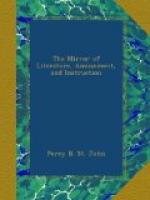VIRGIL.
I have years on my back forty-eight,
SHAKSPEARE’S King Lear.
Four-and-twenty lap-dogs, all of a row,
Four-and-twenty monkeys, kits, and cats,
dit-to;
Four-and-twenty colours in her tawdry
dress,
(A rainbow she in all—but its
loveliness!)
Four-and-twenty tempers, in the four-and-twenty
hours;
Four-and-twenty dreams of suppos’d
vanquished pow’rs,
To wit of four-and-twenty swains—more
or less;
Who have four-and-twenty times, curs’d
her ugliness!
Four-and-twenty trials, ere as many hours
are o’er,
Of four-and-twenty genera of rival Kalydor;
Four-and-twenty scentings with her dear
bergamot,
Four-and-twenty daubs of her dear paint-pot;
Four-and-twenty visitings to four-and-twenty
friends,
And four-and-twenty tales of ’em,
before the day ends;
Of these said four-and-twenty tales just
four-and-twenty versions,
And all of them of all the facts most
farcica perversions.
Four-and-twenty false curls, * *
* * * * *
Four-and-twenty false teeth, and quite
as false a tongue,
Which tells how virtuous was the world
when—she and it were young.
Or rather for these thirty years has moralizing
told,
How this good deed and that she’ll
do, before she grows old:
Four-and-twenty sighs a-day, that our
rude English sky
Is not precise as she—and
may wash off the dye
Meretricious of her cheeks, which are
then like gold,
(Though less tempting;) sweet
and yellow as a marigold![2]
Four-and-twenty wailings o’er the
wedded state,
Yet twice as many every day ’tis
not her fate;
Pretending to the world ’tis mere
choice that has led
To singleness—yet choosing
all the while to be wed,
If any doting fool could be doting fool
enough
To bid for such a breaking down piece
of stuff;
For any such a winter, that has shed the
flowers of spring,
Whose autumn too is flown; nor left its
fruit or any thing!
* * * * *
Yes, such are the marks deep branded
on a class
Of busy blanks, non-entities, creation’s
very farce;
In these scales then be every piece
of Eve’s flesh weighed,
Find these criteria, and be sure
you’ve found an—Ancient Maid!
W. P——N.
[2] So much for the “heinous
crime of self-painting;” as Lord
Chesterfield
says; in speaking of which, “It is even whispered
about
the town, (he observes) of that excellent artist,
Mr.
Liobard, that he lately refused a fine woman to draw
her
picture,
alleging that he never copied any body’s works
but his
own
and God Almighty’s!”
* * * * *




